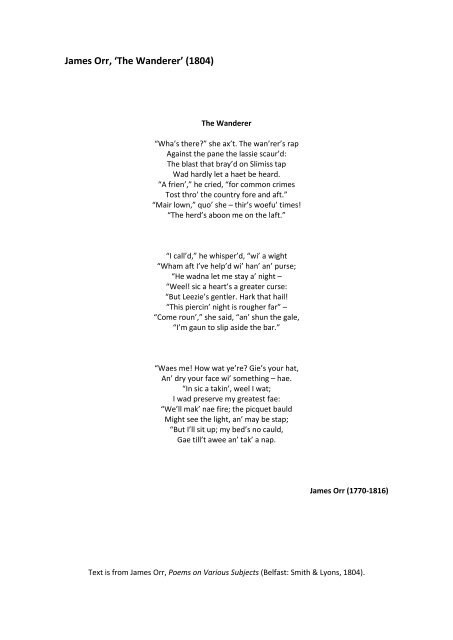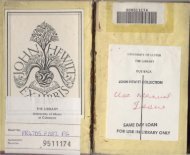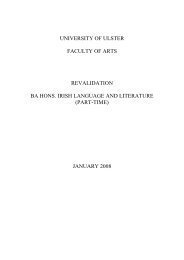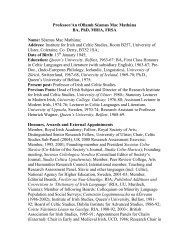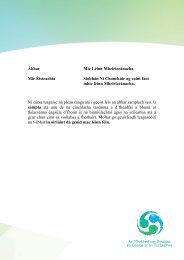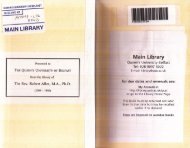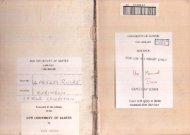James Orr, 'The Wanderer' (1804)
James Orr, 'The Wanderer' (1804)
James Orr, 'The Wanderer' (1804)
You also want an ePaper? Increase the reach of your titles
YUMPU automatically turns print PDFs into web optimized ePapers that Google loves.
<strong>James</strong> <strong>Orr</strong>, ‘The Wanderer’ (<strong>1804</strong>)<br />
The Wanderer<br />
“Wha’s there?” she ax’t. The wan’rer’s rap<br />
Against the pane the lassie scaur’d:<br />
The blast that bray’d on Slimiss tap<br />
Wad hardly let a haet be heard.<br />
“A frien’,” he cried, “for common crimes<br />
Tost thro’ the country fore and aft.”<br />
“Mair lown,” quo’ she – thir’s woefu’ times!<br />
“The herd’s aboon me on the laft.”<br />
“I call’d,” he whisper’d, “wi’ a wight<br />
“Wham aft I’ve help’d wi’ han’ an’ purse;<br />
“He wadna let me stay a’ night –<br />
“Weel! sic a heart’s a greater curse:<br />
“But Leezie’s gentler. Hark that hail!<br />
“This piercin’ night is rougher far” –<br />
“Come roun’,” she said, “an’ shun the gale,<br />
“I’m gaun to slip aside the bar.”<br />
“Waes me! How wat ye’re? Gie’s your hat,<br />
An’ dry your face wi’ something – hae.<br />
“In sic a takin’, weel I wat;<br />
I wad preserve my greatest fae:<br />
“We’ll mak’ nae fire; the picquet bauld<br />
Might see the light, an’ may be stap;<br />
“But I’ll sit up; my bed’s no cauld,<br />
Gae till’t awee an’ tak’ a nap.<br />
<strong>James</strong> <strong>Orr</strong> (1770-1816)<br />
Text is from <strong>James</strong> <strong>Orr</strong>, Poems on Various Subjects (Belfast: Smith & Lyons, <strong>1804</strong>).
Teacher’s Notes<br />
Ulster-Scots Poetry<br />
Strong links have existed between Scotland and Ulster since prehistoric times due to the<br />
narrowness of the North Channel, which has acted not so much as a barrier between<br />
communities, more as a corridor of communication. Plantation settlers and fleeing<br />
Covenanters put down permanent roots in the north of Ireland in the sixteenth and<br />
seventeenth centuries, particularly in Counties Antrim and Down.<br />
During the eighteenth century a poetic movement developed in Ulster which was influenced<br />
by and coincided with the Scots Literary Revival of the same period. The poets were from<br />
many levels of society, but prominent among them were the so-called “Rhyming Weavers”,<br />
often radical in their politics, who followed the example of the Scots poets Ramsay, Fergusson<br />
and Burns by frequently writing in their vernacular tongue. For the Ulster poets this was a form<br />
of Lowland Scots which developed in Ulster and was in some respects influenced by the Irish of<br />
the native population and by the speech of English settlers. The Ulster-Scots poets also used<br />
typically Scots verse forms such as the Christis Kirk stanza and Standard Habbie which have<br />
very distinctive rhyme schemes and metrical patterns.<br />
The poem offered here for classroom exploration is by <strong>James</strong> <strong>Orr</strong>, a handloom weaver and<br />
revolutionary radical. <strong>Orr</strong> took part in the United Irishmen’s Rebellion of 1798. This was an<br />
attempt to establish a more democratic and just Ireland where Catholics and Presbyterians<br />
(<strong>Orr</strong> was a Presbyterian) would not be subject to discriminatory legal and taxation systems.<br />
The Rebellion failed and <strong>Orr</strong> had to spend a period on the run from the authorities. “The<br />
Wanderer” is believed to have been based on his experiences while in hiding in the bleak<br />
neighbourhood of Slemish in County Antrim. It has the rhyme scheme and metrical pattern of<br />
a folk song, and <strong>Orr</strong>’s note to the text indicates that it was to be sung to the tune of “Mary’s<br />
Dream”, a popular Scots air of the time. It is written in what <strong>Orr</strong> himself called “Braid Scotch”.<br />
Curriculum/Assessment<br />
The poem and the activities suggested below are particularly suitable for KS3 pupils in<br />
the Learning Areas of English, Environment and Society (History) or Learning for Life and<br />
Work (Local and Global Citizenship)<br />
They have been designed to develop and test the key skill Communication in the three<br />
areas of reading, writing and talking and listening.<br />
Some activities might be adapted for an ICT activity eg the reporter’s interview of the<br />
Wanderer might be presented in the format of a newspaper report<br />
Practice in Using Maths might be acquired from, eg working out the ratio or percentage<br />
of Ulster-Scots words to standard English words<br />
The activities also address the Thinking Skills and Personal Capabilities Framework as<br />
they are designed to inspire and promote creativity, self-management, working with<br />
others, problem solving and managing information.<br />
2
Pupil Activities<br />
Pre-reading activities – for discussion in groups or pairs<br />
1. Imagine the situation: you live in an isolated district and are alone in the house late at<br />
night. Someone raps on the window and begs for shelter. Do you let him/her in? What<br />
thoughts would run through your mind?<br />
2. Then, imagine you are a wanted man or woman. You are on the run. It is late, dark,<br />
cold and you are out in the middle of the country. You cannot go home for fear of<br />
being caught, but you are desperate to find shelter. You see a light in a small cottage.<br />
Do you ask for help? What would make this a dangerous thing to do?<br />
3. You have been given a copy of the first verse of a poem called “The Wanderer”. You<br />
have a glossary that explains the difficult words. Work out the meaning of verse one in<br />
small groups or pairs.<br />
Now read this:<br />
This poem was written by a man named <strong>James</strong> <strong>Orr</strong> who had taken part in a Rebellion<br />
against government forces in Ireland in 1798. How long ago is that? What century was it?<br />
<strong>James</strong> <strong>Orr</strong> lived in Ulster where a large number of the population spoke, and still speak, a<br />
language called Ulster Scots. <strong>Orr</strong> felt his community was being treated unfairly by the<br />
government and he joined a group of men called the United Irishmen who were prepared<br />
to fight to try to make life more fair for everybody in Ireland. <strong>Orr</strong> and his friends were<br />
defeated in a battle at the town of Antrim on 7 June 1798.<br />
<strong>Orr</strong> wrote this poem based on his own experiences as a man on the run. “Slimiss” is<br />
actually the Hill of Slemish, a wild area of County Antrim where <strong>Orr</strong> and some of the rebel<br />
leaders went into hiding. It was also an area where many people secretly supported what<br />
<strong>Orr</strong> and his friends had done, but they wanted to avoid getting into trouble with the<br />
authorities and were often afraid to help.<br />
Group discussion:<br />
1. Will the lassie let the Wanderer in?<br />
2. What would make her think very carefully before opening her door?<br />
3. What reason does she give for warning the Wanderer to be quiet?<br />
4. Do you believe there is really a shepherd asleep in the loft? Why might she be<br />
inventing this?<br />
3
Reading and understanding the poem<br />
You have been given a copy of the whole poem.<br />
Listen and read while it is read aloud. Then in your groups work out the meaning of the<br />
whole poem, using the glossary.<br />
In groups discuss:<br />
1. Which words or expressions did you have to use the glossary for help with?<br />
2. How does the language of the poem make the reader aware of how cold and wild the<br />
landscape is?<br />
3. How can we tell people have been unwilling to help the Wanderer?<br />
4. How does the Wanderer manage to persuade the lassie to let him in? What makes it<br />
seem as if he and she already know each other? Which line in the poem shows her<br />
taking a definite decision to help him?<br />
5. What instructions does the lassie give the Wanderer? How does she show she thinks<br />
sensibly as well as kindly?<br />
Responding and Writing:<br />
1. Imagine the Picquet calls at the cottage the next day, after the Wanderer has<br />
left. He questions the lassie about whether the wanted man has been seen in the<br />
neighbourhood. Write (or improvise and act) the script of the conversation they might<br />
have. Try to include some Ulster-Scots words when the lassie speaks.<br />
2. The Wanderer leaves the cottage the next morning. Write a short story of 200-500<br />
words about what happens to him. Try to describe the countryside and his hopes and<br />
fears very vividly. Include some Ulster-Scots words if you can.<br />
3. Imagine the Wanderer escapes to America and is interviewed by a news reporter<br />
about his experiences. Act out the interview. The Wanderer should use some Ulster-<br />
Scots words and expressions.<br />
4


